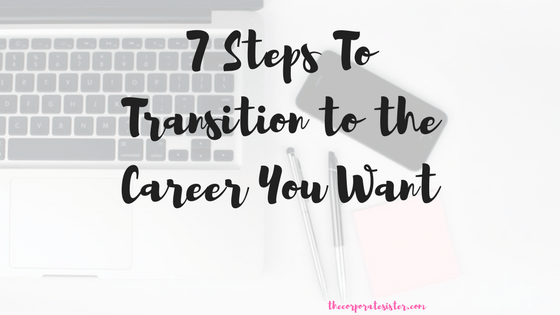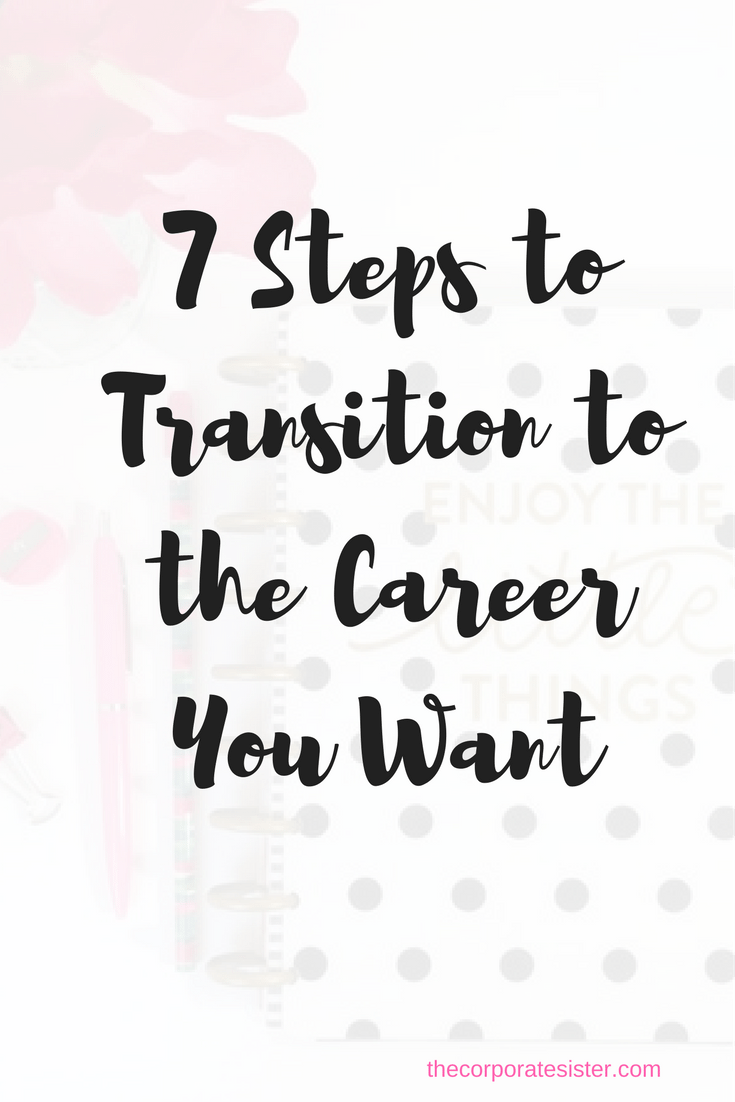You may have been thinking about transitioning to the career you want to work in. You may even have started taking a few steps to look into it. However, transitioning to a dream career is an important, and critical process.
I recently made the leap to the career I really want, from corporate life to being a full-time writer and entrepreneur. For the conservative accountant by trade that I am, it’s a BIG career transition. Yet it’s one that I’ve been anticipating for many years now. I’ve read so much about career transitions, and asked so many questions about it from others who went through it before I did, that when it was time to undergo my own, I had way too much information and not enough structure.
Here’s the thing about career transitions. They’re very personal, and quite complex. You have to make them your own, which means you also have to sift through all the available information out there, and turn it into simple steps you can follow. You know what they say about how to eat an elephant, piece by piece. Well, this is one BIG elephant, and you may want to tackle it piece by piece.
From my own experience and sifting through the gazillion types of advice available, here’s what I learnt about simplifying the career transition process down to seven manageable steps:
-
Get clear about your “Why”
This is a step that so many of us miss, because we’re too busy worrying about the logistics, finances, or other technical factors of career transitions. However, having awareness about where you stand at work and in life can mean a world of difference between a successful career transition and one that leaves you wanting for more.
Before starting anything new, especially something as new as a career transition, you want to identify your “why”. The last thing you want is to end up somewhere you hate more than where you initially were.
What to do: Ask yourself why you really want to do what you want to do? How will this make your life and career better? What are the risks and/or rewards involved?
-
Know what to expect
One of the biggest mistakes we make when doing a career transition is not being clear on what to expect. What does your new career consist in? Will you be using your skills and network to successfully transition from one career, or one job to the other?
It’s not just about following your bliss, and seeing where it will take you. Actually, according to scientific researcher and computer scientist Cal Newport, there’s a lower probability of being fulfilled in the long-term when you follow your passions then when using your existing career skills.
What to do: Research your prospective career and gather as much information as possible. Make an inventory of skills and connections in your prospective career and seek ways to connect with them.
-
Take your emotions into account
Very little is being said about the emotional toll it takes to undergo a career transition. It’s important to make space and room for your emotions during your transition There will be a certain amount of nostalgia as you leave one career, or job to another. There will also be a certain learning curve needed to adapt to your new career and environment.
One mistake I made when transitioning careers was to discount the role of my emotions. Instead, I tried to repress them, or blamed myself for them. I later learnt they’re a normal part of the process, and should be acknowledged for a better transition.
What to do: Acknowledge your feelings and use them as GPS to guide you through the process. Your emotions will serve you as a guide while you transition, pointing you to what fulfills you and what frustrates you. Being kind to yourself through the process will also help you ease into the challenges at hand.
-
Figure out the “How”
Once you’ve figured out your ‘Why”, and know what to expect, start working on your action plan. What are your goals when transitioning careers? How much time do you expect to need to meet your goals?
What to do: Write down each goal, focusing on the primary ones. Detail the steps necessary to accomplish these goals, such as trainings you’ll need to attend, events you’ll need to attend, people you’ll need to connect, etc. For each step, devise tasks to accomplish daily or weekly. This will help you get started, stay productive, while giving you the motivation you need to accomplish more.
-
Mind your brand
Your personal and professional brand shifts with each career transition. It’s not that you need to change who you are when transitioning to the career you want. As you progress and evolve, so does your personal and professional brand. Don’t hide all this progress, instead be willing to show and leverage it as you step on new grounds.
What to do: Adjust your resume, social media profiles (especially your Linked In profile), to reflect your evolving professional brand. Do not be afraid to show up as you are!
-
Track your progress!
Transitioning to the career you want is a process. It involves some ups and downs, as well as times when you may be accomplishing more than at other times. Track your progress, and learn from the process.
What to do: Keep a running list of tasks and deliverables associated with your transition. Assign yourself some deadlines and milestones to meet, and track your progress against these.
-
Get the support you need!
Last but not least, any type of career change or transition requires you to have the support you need to help you through it. Mobilize your posse, and share your journey’s ups and downs with your close family and friends. Take a break every now and then, and grab a drink with your favorite girlfriends.
In the same way, expand your professional network to include potential mentors and colleagues who can help you through your transition.
What to do: Get out of your shell, and let others help and support you! Ask your close circle of family and friends to take some things off your plate, like child support or administrative tasks, for instance. Reach out to and connect with potential mentors and colleagues who can help you through the process.
Here’s my YouTube video on the topic:
In Conclusion:
- Get clear about your “Why”
- Know what to expect
- Take your emotions into account
- Figure out the “How”
- Mind your brand
- Track your progress!
- Get the support you need!
How did you prepare to transition to the career you wanted? What would you add to this list?
To Your Success,
The Corporate Sis.








